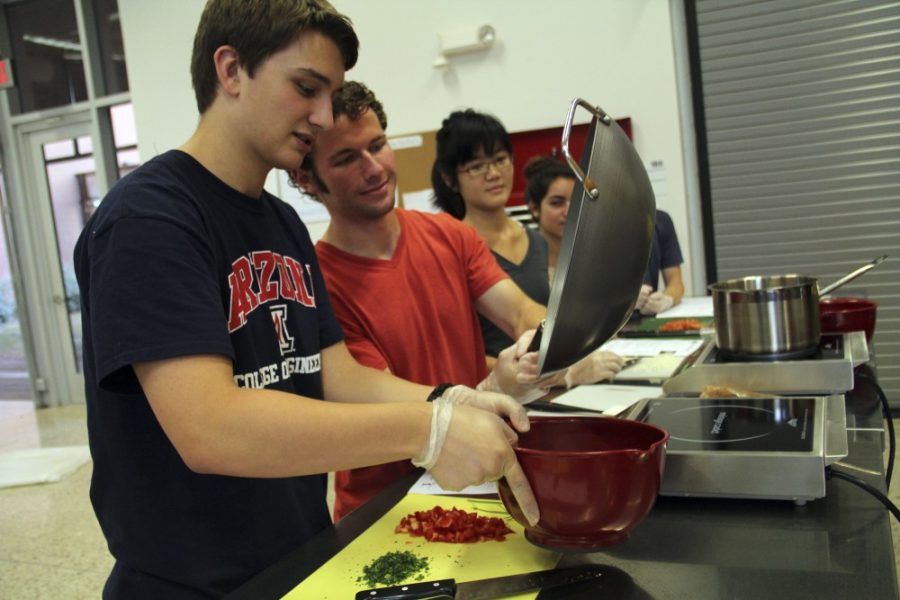Mouthwatering smells of cultural food filled the Student Recreation Center as students cooked up healthy, homemade meals during the Cooking on Campus program.
The program is offered through seven different class sessions at the Rec Center, and aims to teach students how to cook healthy recipes and learn the basics of cooking techniques.
Chefs began by introducing themselves to the students and introducing the recipes. Students were taught to practice safe, sanitary practices, such as washing hands, wearing gloves, tying their hair and washing cutting boards to avoid cross-contamination.
The class taught basic pan skills and worked to make students more comfortable with basic proteins. A chicken and shrimp paella recipe was featured at the class while the recipe focused on preparing a meal all in one pan for a quick, easy clean up.
“This really is the first advanced meal I have cooked,” said Meezan Mir, a philosophy, politics, economics and law freshman. “I have learned a lot from my class.”
In the past four semesters of offering the class, the program has improved the services they provide to students. This semester, an additional four tables were needed to meet the number of the students, compared to only having two tables in previous years, said Gale Welter, campus health nutrition services coordinator.
The program offers different skills and recipes at each class, meaning no class is the same. This semester is more skill-based. The meetings used to be once a month but have progressed to being two times a month. Students used to have to sit and watch the main chef cook a meal, whereas now they get to experience hands-on participation by cooking a meal in groups.
Students were able to taste their food after it was made, but some students felt like the class could be even more personable in the future.
“I would’ve liked it more if it was me personally cooking from beginning to end,” said Shanan Immel, a microbiology sophomore.
The teaching technique also changed this semester to allow one main chef to teach the classes with a microphone, while the rest of the student chefs help each individual student.
Meghann Miller, main chef for the past three semesters of the program and a dietics senior, works 10 hours a week for $10 an hour. She plans the recipes two weeks prior to the scheduled class.
“Sometimes I will look up stuff online for inspiration and tweak it to make it healthier,” Miller said. “It definitely challenges me.”
The initial investment of the program was $5,000 and the fees for the classes help supply the equipment.
“We believe in it so much,” Welter said. “All the partners involved, just say, ‘OK, we know we’re not making money on this’ — which would be nice, but we never will. But we love offering this to our students.”
Previous events included knife skills and mastering your microwave. Knife skills highlighted dicing, mincing, the batonnet, chiffonade and julienne techniques, as well as the proper way to sharpen a knife. Master your microwave consisted of lessons for students when they are limited in cooking utensils and making a zucchini bread and salmon with corn and avocado salsa.
The next class, “Wok Your World,” will be offered on Oct. 9.








